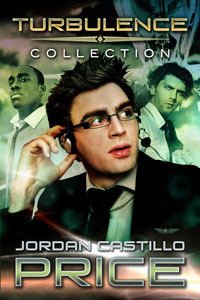Interview with Jordan Castillo Price!
 I’m incredibly excited to interview Jordan Castillo Price here today. She’s the legendary author of the hugely successful Channeling Morpheus and Psycop series, as well as amazing stand alone novels like Hemovore, Zero Hour, Starving Years and Magic Mansion (be still my heart) as well as being the visionary editor responsible for the Petit Morts with Josh Lanyon, Sean Kennedy and Clare London. Today she’ll be answering my questions about her newly completed series – Turbulence, and she’ll be giving away to one lucky commenter.
I’m incredibly excited to interview Jordan Castillo Price here today. She’s the legendary author of the hugely successful Channeling Morpheus and Psycop series, as well as amazing stand alone novels like Hemovore, Zero Hour, Starving Years and Magic Mansion (be still my heart) as well as being the visionary editor responsible for the Petit Morts with Josh Lanyon, Sean Kennedy and Clare London. Today she’ll be answering my questions about her newly completed series – Turbulence, and she’ll be giving away to one lucky commenter.
DEV: I’m always impressed by your ability to write a novel serially and have everything hang together with very little editing needed when you bring it all together at the end. Does your process writing this kind of book differ from how you write your other work? And do you think that writing chapters on a deadline for your newsletter has changed the way you write your other novels?
JORDAN: I think there’s definitely a difference, because when I release something serially and I discover a contradiction, I simply have to let it go and fix it in final edits, and presume my audience understands that the first release may have an inconsistency here or there.
 That said, I don’t deliberately contradict myself. In Turbulence, there’s an important rainbow sticker about 3/4 of the way through the series. If I’d been writing it as a novel rather than a serialized piece, I could have gone back and planted the sticker at the DC bar scene that happened in book 4. There’s a kid by the door and Paul hands him an awful martini as he storms out. If I could have gone back and added foreshadowing, I could’ve had the kid give him a sticker. Instead I had to explain the sticker on the spot in book 7, and it didn’t feel as integrated as it would have if I’d planted it earlier.
That said, I don’t deliberately contradict myself. In Turbulence, there’s an important rainbow sticker about 3/4 of the way through the series. If I’d been writing it as a novel rather than a serialized piece, I could have gone back and planted the sticker at the DC bar scene that happened in book 4. There’s a kid by the door and Paul hands him an awful martini as he storms out. If I could have gone back and added foreshadowing, I could’ve had the kid give him a sticker. Instead I had to explain the sticker on the spot in book 7, and it didn’t feel as integrated as it would have if I’d planted it earlier.
A story is really a series of causes and effects. The story feels more resonant when the causes are seeded early and play out in a satisfying way throughout the piece. I suppose writing serially has made me appreciate that when writing novels I have the ability to go back and weave in new parts of the story as they occur to me so they feel predestined.
DEV: Dallas and Paul are both really sweet guys and I love how well suited they seem. There are so many nice balances between them like that while Paul has the higher income job, Dallas has much more experience on this particular spooky flight. How do your characters come to you – are they fully formed when they arrive in your head or do you build them more consciously?
JORDAN: Your question is interesting because there are things that could be seen as differences, but you see them as balances. Maybe difference and balance are two sides of a coin. I think neither of them would be much attracted to someone like themselves. They need contrast, difference and balance.
 When I create a new character, they aren’t exactly fully-formed, but I start them off with some key personality traits that I’m dogged about remaining faithful to. Dallas, at heart, is a competent caretaker, and Paul is a tightly-wound skeptic with something to prove. Being super clear on a character’s core can often make it seem as if I’ve spent ages fleshing them out. I find that pre-fleshing a character, as some writing workbooks might have you do by subjecting them to a lengthy and arbitrary character interview, is actually counterproductive. It takes the life and discovery out of putting the character through their paces.
When I create a new character, they aren’t exactly fully-formed, but I start them off with some key personality traits that I’m dogged about remaining faithful to. Dallas, at heart, is a competent caretaker, and Paul is a tightly-wound skeptic with something to prove. Being super clear on a character’s core can often make it seem as if I’ve spent ages fleshing them out. I find that pre-fleshing a character, as some writing workbooks might have you do by subjecting them to a lengthy and arbitrary character interview, is actually counterproductive. It takes the life and discovery out of putting the character through their paces.
DEV: It’s rare to read a story in which race is handled with subtlety and grace. It seems to me you’ve done that with Dallas and Paul. Can you talk about that aspect of the relationship, what it was like to write it and how readers have responded to the subtle and overt racism exhibited by various characters in the series?
JORDAN: Early readers wanted me to tone down the racial aspect, but I felt that by having Paul and Dallas encounter resistance to their budding relationship, I was honoring the reality. Later readers let me know they thought I hit the right balance. I’d say the racism was mostly subtle, mostly matter-of-fact, at least until Paul introduces his racist drinking friend to his new black boyfriend. That conversation was maybe 300 words long and took me two days to write, because it was so crucial to have it be as perfectly insulting and horrible as it needed to be.
 DEV: Dallas is a caretaking type of guy – he raised his niece and he takes care of the pilots when they’re in alternate Bermuda. How do you see that changing on the few occasions when Dallas climbs in the cockpit for the turbulence and alternate Dallas ends up in Bermuda?
DEV: Dallas is a caretaking type of guy – he raised his niece and he takes care of the pilots when they’re in alternate Bermuda. How do you see that changing on the few occasions when Dallas climbs in the cockpit for the turbulence and alternate Dallas ends up in Bermuda?
JORDAN: I think alternate-Dallas still takes care of people, but in an entirely different and much sassier way. He’s probably responsible for providing free mimosas for the passengers. Probably with Paul’s money.
DEV: The whole situation challenges Paul much more than Dallas, not just because he’s new to it, but because it shakes up his view of the world. And in turn his skepticism is the hardest thing about him for Dallas. What would you like your readers to take away from that dynamic?
JORDAN: I think we need to allow our friends to be who they are. Basing your approval of someone on whether they’ll change for you is a sure way to end up with a lot of resentment down the road. Paul and Dallas would not have been compatible, ultimately, if Paul remained an atheist, because faith is simply too important for Dallas. But the shift from atheist to agnostic is actually enough to bring them into alignment.
DEV: Marlin – he’s the joker in the deck, a secondary character so important he gets his own cover. Marlin’s already dead by the time Paul enters the story, and yet Paul’s relationship with Marlin changes over the course of the series. Does that mirror Paul’s personal development and what influence do you think Marlin has the story even though he’s absent? In other words, could you talk about Marlin for a little bit?
JORDAN: I’ve been thinking about it and I think Marlin may actually be the antagonist. His intent isn’t malicious and he isn’t actually present, but his past actions create conflict after conflict for Paul, every step of the way.
 Marlin shapes the whole story, no doubt. Having him kill himself in the first scene set a certain tone: that the story would be intense. That stakes were high. And, for the people who paid attention to his emotional state, that something very weird was going on.
Marlin shapes the whole story, no doubt. Having him kill himself in the first scene set a certain tone: that the story would be intense. That stakes were high. And, for the people who paid attention to his emotional state, that something very weird was going on.
The Paul/Marlin relationship doesn’t have a gradual arc. It has a pronounced shift, a kind of epiphany, in the final book. There’s a moment where Paul realizes they’re not opposites at all, as he’d been presuming, and that in fact they’re a lot alike. That realization mirrors his relationship with Dallas, I suppose. It reflects that they’re different, but in the ways that are important, they’re in synch.
Thanks so much for having me over to chat about the Turbulence series, Dev, it was fun! And I’d also like to give away an ebook copy of the Turbulence Collection to one of the commenters, so if you’re reading, be sure to comment!



